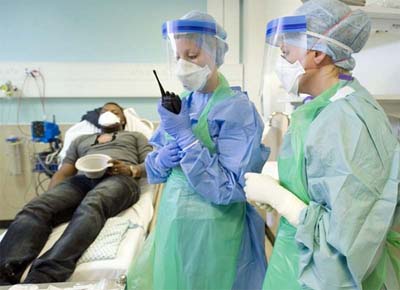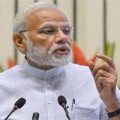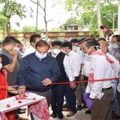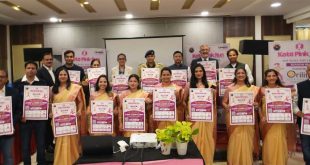BY Neeharika Varshney
News wave @ New Delhi
It is said that God cannot be everywhere so He created mothers and doctors. We often call Moms our super heroines or multi-task masters. We remember her even in minutest of the difficulties. They are a source of continuous inspiring energy to combat any challenge, however small or big it may be. Health workers also play a divine role and serve the community without any difference in their colour, caste or creed. They try to revive a human body with ailments to come out of it. But, what if, someone is playing the double role of mothers and health workers? If we combine these two, there comes a section of people who are “female health workers” who are the true angels sent by God for maintaining and nurturing its beautiful world. While they may be doing marvellous work, they very often, like in current pandemic, have to work in high risk areas and may carry infections to home. Has someone thought of the psychology of these female health workers, how do they prepare themselves for their commitment and what motivates them?
They say, responsibilities come with the family. Often, lady of the house has to run a household. She is always concerned or rather worried about her children, her husband , her in laws, and their clothing, food, preparation of various assignments, helping children in school work/projects, dealing with house helps, managing colony affairs and even the social responsibilities of the bigger clans. If one could sum, she is the House Manager who is responsible for all chores at home. I bet not even a single minute, even if she is engaged in her professional task, passes away in which she would not be concerned about her family or various pending household chores. In fact, we are so dependent on our Mothers that we cannot think about managing the house even for a day without them.
In case of health workers, their professional duty comes first. They have to be by their patients side as and when required irrespective of the time of the day. Health workers are working at many places at a time. A doctor has to see new and old patients as the Out Patients (OPD) as well as attend to the In-patients (IPD or patients admitted to hospital). In addition, doctors may have to perform surgery, carry out investigations. Other health workers also prepare patients for various treatments and take care of them post surgery/ investigation. This requires close interaction with patient, ailing humans who might be carrying different types of diseases. This exposes health workers to potential risk as they may inherit infections from their serving patients. Health workers attending to those patients, who are carrying communicable diseases, are most vulnerable as they are exposed to infection, like in the current pandemic. For treating these patients, though health workers take special precautions, prepare themselves to minimize the risk, but could still be exposed and could carry infection home and gift it to their family members, including young children and aged parents.
In the current pandemic, we are very proud to say that these workers have been our frontline warriors. None of the Health workers has opted out of duty in this hour of crisis, even if they were not dealing with patients of communicable diseases. What keeps them going, what motivates them and how do they prepare themselves to work in this hour. I had a chat with couple of health workers. A young doctor and an aged nurse. The lady doctor in discussion is married to a doctor and has a young child and in laws at home, whereas the nurse in discussion is middle aged and has her grown up children and parents.
The doctor, I talked to, works in a reputed private hospital. She did her hospital duty when the hospital turned fully Covid 19 treatment centre. She has a 2.5 year old child and leaving him to go out for her duty wasn’t easy enough for her. Fearing the high risk while dealing with Covid patients, her parents told her to resign and join the hospital again when the situation was normalized. They feared for her child who was at major risk and of course their daughter as well. But, being into such a profession requires a lot of determination and she proved it. She said to herself, why did she become a doctor and during times like this, it was her moral duty to treat her patients and not turn her towards back to them. To get positive vibes, she always felt happy seeing patients recover but a few things always bothered her. We always tend to think negative before positive for our loved ones. She used to think that what if some sort of mishappening occurs to her? Like if she became Covid positive and in turn gifted it to her family as well? Her doctor husband was also on Covid duty. That puzzled her even more. But she never allowed time to these thoughts which may become a barrier between her and her Covid duty. She and her friends who also have small children at home decided to leave their children to a nearby relative for a while as precaution. Being separated from their children isn’t easy enough for a young mother no matter what would have been the circumstances. During the initial days of the pandemic, her duty was flexible, of 24 hours a week. When this pandemic started rising, her duty schedule changed to working 8 hours per day for a week. Next week, she would be in quarantine away from home as directed by her hospital followed by a home leave for a week. Due to her new and prolonged schedule, she started worrying about the thoughts her child may have. She had some foolish yet bothering thoughts that what if her kid forgets how she looks like? What if he forgets his own mother? But with the support of her family and most importantly by making herself mentally strong she enjoys her challenging duty days. Only motivation for her was smile of the recovered patients.
I also had a chat with a nurse working in a government hospital. Unlike private hospitals, she did not get the facility of hotels or any other facility of living away from home for quarantine immediately after her duty. She used to return home daily after work, go straight to her bathroom, take a bath, wash her hospital clothes and then return to her household schedule. As a step of precaution, she had separated herself from the rest of the family. She took a separate room for herself though she was cooking for the family. It was difficult to persuade her child who wished to hop into their mothers arm, as in the normal days. Though she and her colleagues took all possible precautions, but soon many of her hospital staff became Covid positive. Even after taking all the precautions, sadly she became positive during her duty. The most shocking news to her was that not only she got infected but also gifted it to her 16 years old child and her mother. It was a huge traumatic experience as she realized that instead of appreciating devotion to her service, people in colony started avoiding not only her but even her family members. Residents of families in her staircases were virtually shouting at her and the threat she has brought to the society. In her home isolation, she wondered hours and hours if she did right or wrong. Of course, the fear if she, her child and her mother could recover from it or not was constant. Managing herself looked bleak at times as she was aur loss of ideas about her and her family.
Not just this but imagine the situation of the female nurses and doctors while treating the Covid patients and getting their monthly cycle of menstruation. When you have your duty you have to wear a protection dress also called “safety kit” or ”PPE” (personal protection equipment) and it is advised to remove it once you have completed your duty to minimize the chances of inheriting the infection. While wearing the kit one cannot eat, drink, visit toilets etc. Imagine their situation without eating or using washrooms for 8-12 hours. This deserves a lot of respect for all the health workers and we are indeed grateful of them. As the kit is fully made of plastic, there are some of its drawbacks. It causes excessive sweating and one feels dehydrated. To avoid this condition, health workers intake glucose/electrolysis before or after their duty hours but not in between. Because of the masks, one has to breathe their own breath for hours and this causes fogging on the face shield making the visibility less.
These two are just case studies but it stands true for all health workers. In both the cases, they said the same thing. They quoted” we cannot change our destiny but it will be an honour to serve during a time which is history to be”. I wish we have more respect for female health workers in society and in their difficult times instead of ostracising them or their family, appreciate their fighting spirit and support their families. Even providing daily essentials, or supporting their families emotionally would be filling a void.
 News Wave Waves of News
News Wave Waves of News








